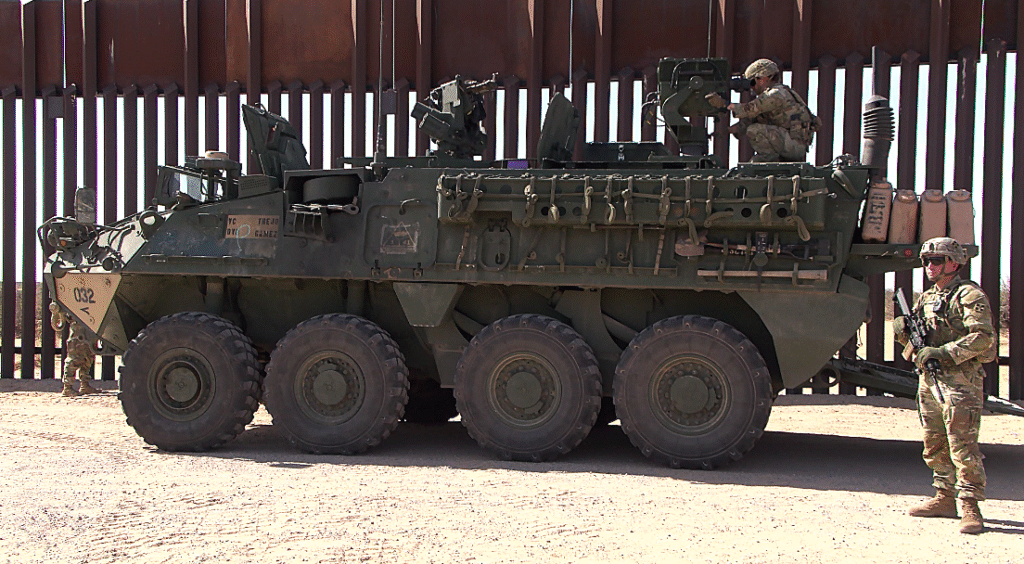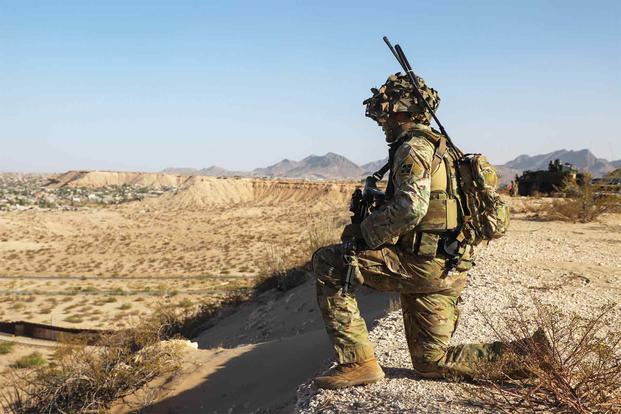
In a startling escalation of border enforcement strategies, 82 individuals were arrested and charged with trespassing on U.S. military property near Sunland Park, New Mexico—a sparsely populated region that straddles the increasingly tense boundary between the United States and Mexico. The announcement from federal authorities has ignited intense nationwide debate over the role of the military in domestic border control operations, the application of federal trespass laws in immigration-related scenarios, and the humanitarian implications for the migrants involved. This development marks a new and controversial chapter in America’s long and often conflicted relationship with immigration policy, sovereignty, and civil liberties.
The Arrests: Inside the Military Zone Incident
The group of 82 people—comprising men, women, and several unaccompanied minors—was detained by authorities after entering a portion of land recently designated as a military-controlled area. According to officials, the arrests occurred within the boundaries of a National Defense Area (NDA), which gives federal authorities enhanced jurisdiction and the capacity to restrict access to civilians for national security reasons.
The individuals were accused of unlawfully crossing into this designated military site without authorization. While many of them were undocumented migrants likely seeking asylum or attempting to enter the U.S. for economic opportunities, their presence on military property complicates what would otherwise be handled as a standard immigration matter. Instead, each detainee is now facing both immigration charges and federal trespassing charges—a dual legal challenge that could result in harsher penalties, longer detention periods, and legal complexities not typically associated with immigration violations.
Understanding the National Defense Area Declaration
The concept of a National Defense Area (NDA) is not new, but its use in this case is highly unusual. NDAs are typically declared in moments of heightened security sensitivity, such as during presidential visits, nuclear site protection, or in times of war. In this instance, the Department of Defense invoked NDA powers to secure an area of land near the southern border, citing national security concerns related to illegal crossings and drug trafficking routes.
Critics argue that such a move dangerously blurs the line between national defense and immigration enforcement. The use of military powers to detain civilians raises red flags for legal scholars and civil rights groups alike, who see the designation as a workaround to limit constitutional protections such as due process and civilian oversight. Legal experts have warned that the use of an NDA in this manner could open the floodgates for future militarization of immigration enforcement—a prospect many view as deeply troubling.
Legal Ramifications of Trespassing on Military Land
Federal trespassing laws governing military sites are notably strict. Violators can face up to a year in prison and fines up to $100,000, depending on the nature of the breach. When combined with immigration-related charges, the consequences become far more severe for the individuals involved. Lawyers representing several of the detainees have already voiced concerns that their clients were unaware of the military designation, and that they were not adequately informed about the boundaries they crossed.
According to court filings and early statements from public defenders, many of the migrants were fleeing violence, poverty, or persecution in their home countries. In their view, the act of crossing into a military zone was unintentional and made under conditions of desperation. Nonetheless, federal prosecutors are moving forward with charges, stating that ignorance of the boundary does not exempt individuals from responsibility when entering restricted areas.
A Politically Explosive Backdrop
This development arrives at a time of peak political friction over immigration policy in the United States. With the 2024 presidential election cycle still fresh in national memory, the southern border remains a centerpiece issue for both major parties. Republican lawmakers have increasingly called for stronger enforcement and have criticized the Biden administration for what they describe as lax border policies. In contrast, Democrats have attempted to strike a balance between enforcement and humanitarian relief, advocating for a more nuanced and comprehensive approach.
The arrests in New Mexico have been seized upon by both sides of the political aisle. Hardline conservatives have praised the military’s role in deterring unlawful entry, calling it a necessary step to protect national security. Progressive lawmakers and advocacy organizations, on the other hand, view the action as a dangerous overreach that dehumanizes migrants and infringes on civil rights.
Military Involvement Raises Constitutional Concerns
One of the most controversial elements of this story is the military’s expanded involvement in civilian law enforcement at the border. While the Posse Comitatus Act of 1878 prohibits the military from conducting domestic policing duties, exceptions can be made under certain national defense provisions. By designating the area as a National Defense Area, federal agencies have effectively circumvented this longstanding legal barrier, placing military personnel in a quasi-policing role.
This precedent worries many legal analysts, who believe that turning military forces into de facto border patrol officers could invite abuse and set dangerous legal standards. The military, unlike civilian law enforcement, is not trained or equipped to handle immigration scenarios, which often involve vulnerable populations including children, the elderly, and individuals with medical needs.
Voices from the Ground: Humanitarian Concerns Mount
Local humanitarian aid workers and residents have expressed deep concern over how the arrests were conducted. According to those familiar with the situation, the group of 82 individuals included families with young children, some of whom required immediate medical attention after their apprehension. Emergency response units and medical volunteers were dispatched to treat dehydration, exposure, and exhaustion.
A local nonprofit that supports migrants along the southern border described the event as a “tragedy born from policy.” Their spokesperson emphasized the need for reform rather than escalation. “We are criminalizing people who are fleeing unimaginable conditions. The answer cannot be razor wire, military zones, and federal prisons. We must respond with compassion, not tanks,” they stated.

Community Impact in Sunland Park and Surrounding Areas
The city of Sunland Park, a small border town with a population just over 17,000, has found itself at the epicenter of a national debate. Residents here are no strangers to the realities of immigration, often witnessing both the struggles of migrants and the pressures on local law enforcement. However, many say that the recent military activity and heightened federal presence have disrupted daily life in profound ways.
Local businesses, particularly those near the military-designated zone, report reduced customer traffic and a growing atmosphere of fear and uncertainty. Some families have begun limiting their movements, fearing that increased surveillance and enforcement might result in mistaken identity or unlawful detention.
City officials have remained cautious in their statements, urging residents to remain calm and cooperate with authorities while also pressing federal agencies for transparency and accountability.
The Bigger Picture: U.S. Immigration Policy at a Crossroads
The incident in New Mexico underscores a pivotal moment in U.S. immigration policy. As the number of border encounters continues to climb, the federal government is struggling to reconcile security concerns with the need for humanitarian solutions. In many ways, the current crisis echoes past periods of immigration unrest—from the Bracero program of the mid-20th century to the family separations under the Trump administration. Each era has been marked by controversy, political division, and calls for reform.
Experts agree that the current patchwork of executive actions, court decisions, and congressional inaction has created an unsustainable situation. Without legislative reform, federal agencies are increasingly resorting to extraordinary measures—like the militarization seen in New Mexico—to manage an ever-growing flow of migrants. These actions, however, carry high costs in both human and legal terms.
Calls for Investigation and Oversight
In the aftermath of the arrests, several civil rights organizations, including the ACLU and Human Rights Watch, have called for a full investigation into the federal decision-making process that led to the NDA designation. They argue that the lack of public consultation, the opacity of the boundaries, and the involvement of military forces in arrest operations represent grave threats to civil liberties.
Several members of Congress have also voiced concern. Representative Veronica Escobar of Texas issued a statement urging the Department of Homeland Security and the Department of Defense to explain their rationale and ensure the protection of due process rights for all detainees.
What Happens Next for the Detainees
For the 82 individuals arrested, the road ahead is uncertain. Some may face expedited removal, while others could seek asylum and be placed into long legal proceedings. Those with trespassing charges face an additional hurdle that could complicate their immigration status or eligibility for relief. Legal aid groups have mobilized to provide representation, but the sheer volume of cases and the legal novelty of the charges present serious challenges.
Advocates are pushing for the dismissal of the federal trespassing charges on the grounds that the individuals were not provided proper notice of the restricted area and were likely unaware of their exact location. However, whether the courts will accept these arguments remains to be seen.
Conclusion: A Tipping Point in Border Policy?
The arrest of 82 people for trespassing on military land in New Mexico is more than a regional incident—it is a flashpoint in the ongoing national debate over immigration, border security, and the use of military force within U.S. borders. While supporters of the action argue it demonstrates strong federal resolve, critics view it as a step toward authoritarian enforcement policies that disregard basic human rights.
As legal proceedings unfold and advocacy groups continue to shine a spotlight on the situation, one thing is clear: America is approaching a tipping point in its approach to the border. Whether it leans toward greater militarization or toward comprehensive reform will be a defining question for the country in the months and years to come.

